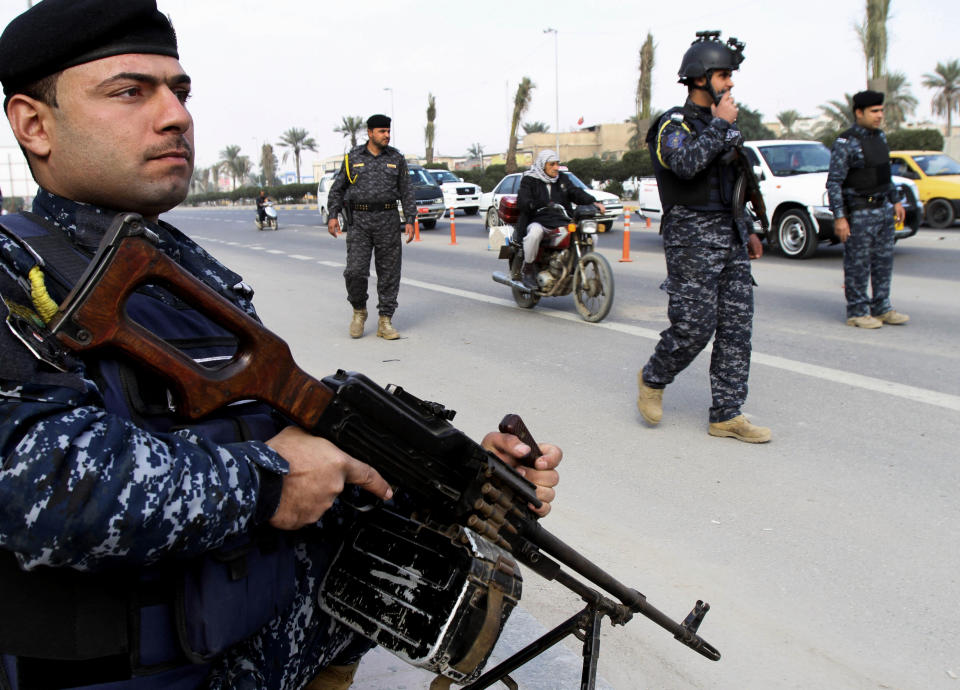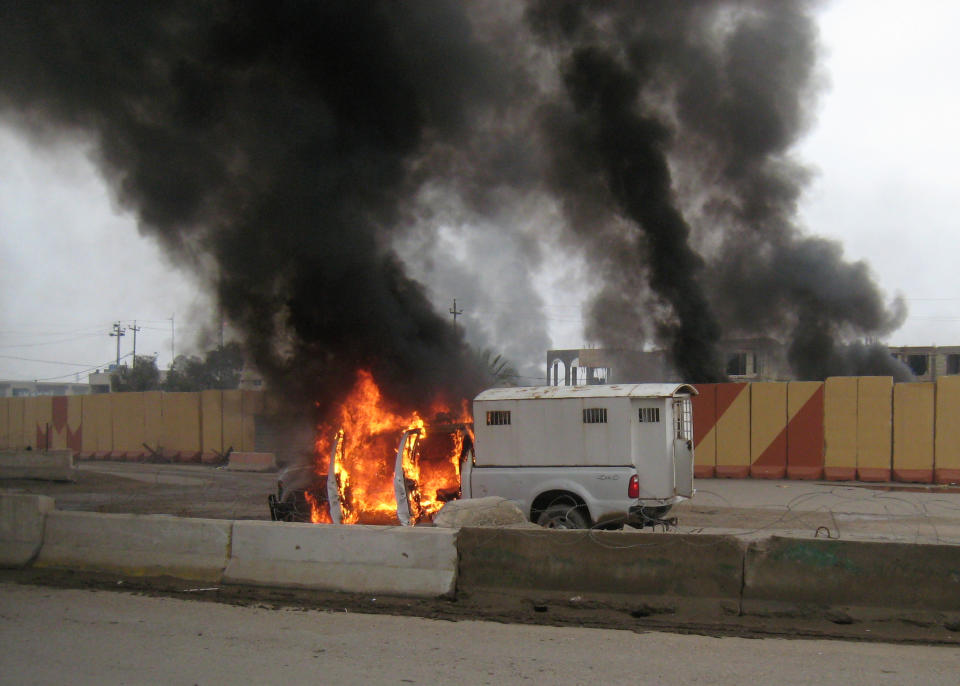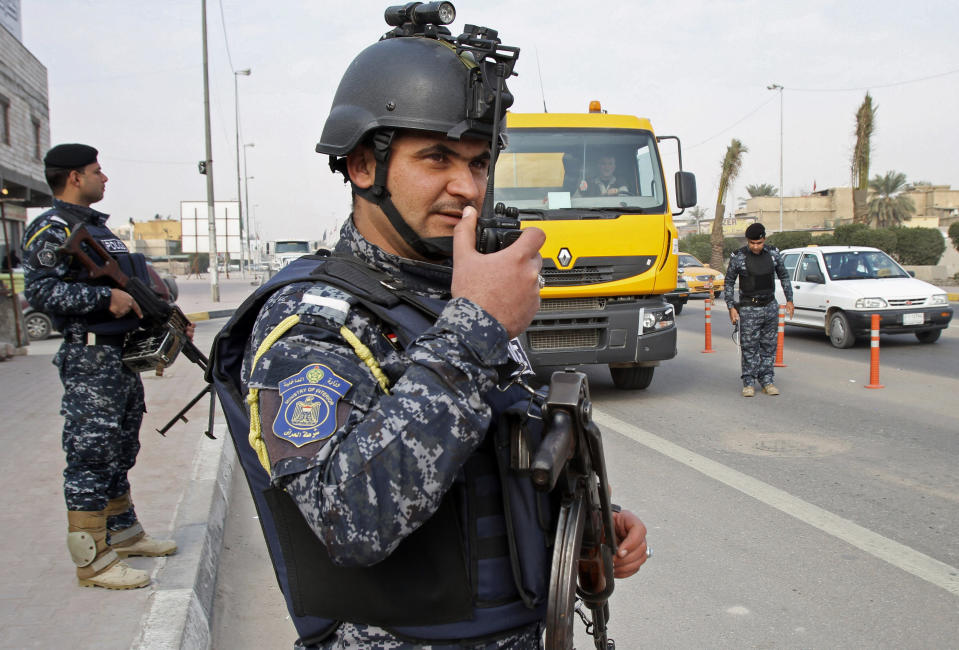Iraqi security forces arrest Shiite militia leader
BAGHDAD (AP) — Iraqi security forces arrested a controversial Shiite cleric who leads an Iranian-backed militia, a move apparently aimed at bolstering Sunni support as the Shiite-led government and allied tribes on Thursday battled Islamic militants who rose up in multiple Sunni-dominated cities.
Security forces and tribal fighters clashed with gunmen from al-Qaida's Iraq branch a day after the militants launched a wave of attacks, fanning out to take over police stations and military posts in at least four cities and towns in western Anbar province. Militants set up checkpoints in streets and roved through several Anbar towns in security forces vehicles they had seized, waving al-Qaida banners.
The heaviest fighting Thursday came in the former insurgent stronghold of Fallujah, 60 kilometers (40 miles) west of Baghdad, where two security officials said their forces were meeting particularly heavy resistance from al-Qaida fighters. The officials spoke on condition of anonymity because they were not authorized to talk to the press. There was no immediate word on casualties.
Sectarian tension has been mounting in Iraq since last year. Minority Sunnis complain of discrimination against them at the hands of Shiite-led government.
That tension escalated to bloody clashes this week after two moves by the government: the arrest of a Sunni lawmaker wanted on terrorism charges and the dismantling of a Sunni protest camp in the capital of overwhelmingly Sunni Anbar province.
In a concession to Sunnis, Shiite Prime Minister Nouri al-Maliki on Wednesday pulled back military troops from Anbar, allowing local police to take over security duties. That was a main demand of discontented Sunni politicians who see the army as a tool in the hand of al-Maliki to target his rivals and consolidate power.
But soon after the pull-out, the militants launched the simultaneous assaults in several Anbar cities. Al-Maliki quickly ordered military reinforcements back in and called on Sunni tribesmen — many of whom deeply oppose al-Qaida — to help put down the militants.
The arrest of the Shiite cleric, Wathiq al-Batat, appeared to be aimed at ensuring Sunni support. Sunnis have long accused the government of targeting only Sunni militant groups while blessing Shiite ones.
Last year, al-Batat — at the time a little-known cleric — announced the formation of the so-called Mukhtar Army to protect Shiites from attacks by Sunni extremists. He claims to have more than 1 million members, a number that has not been independently verified.
He has been wanted by the government since last year. Al-Batat took responsibility in November for firing six mortar shells at a region of Saudi Arabia bordering Iraq and Kuwait, describing it as retaliation for Saudi religious decrees that allegedly insult Shiites and encourage killing them. He also claimed responsibility for attacks on a camp hosting an Iranian opposition group.
Al-Batat was a leader in Iraq's Hezbollah Brigades, which is not related to the better-known Lebanese Hezbollah. Hezbollah in Iraq is believed to be funded and trained by Iran's elite Revolutionary Guard and was among the Shiite militias that targeted U.S. military bases months before their December 2011 withdrawal.
Interior Ministry spokesman Saad Maan Ibrahim told The Associated Press that al-Batat was arrested in Baghdad on Wednesday. Ibrahim said that no one was arrested with him and gave no further details.
Besides Fallujah, security forces and tribesmen battled militants in Anbar's provincial capital, Ramadi and nearby towns. They were able to take back several police stations in Ramadi, the security officials said.
Iraq's al-Qaida branch has fed on Sunni discontent and on the civil war in neighboring Syria, in which mostly Sunni rebels fight a government whose base is a Shiite offshoot sect. It has targeted civilians, particularly in Shiite areas of Baghdad, with waves of co-ordinated car bombings and other deadly attacks.
Outside of Anbar, militants carried out two attacks in Latifiyah, a mainly Sunni town 30 kilometers (20 miles) south of Baghdad, killing seven people and wounding 14 others, according to security officials, speaking on condition of anonymity as they were not authorized to release information.
The deadliest of the attacks was the bombing of an outdoor vegetable market that killed five civilians and wounded nine others. In the second attack, two soldiers were killed and five others wounded when their post came under fire by gunmen. Three militants were killed in the exchange of fire.
Violence has accelerated in Iraq since April, after the Shiite-led government staged a deadly crackdown on a Sunni protest camp.
On Wednesday, the United Nations said last year violence claimed the lives of 7,818 civilians in Iraq in 2013, the highest annual death toll in years. The U.N.'s monthly figures for both civilians and security forces over the year totaled 8,868.
Death tolls dipped following a U.S. troop surge and an alliance of Sunni militias with U.S. forces against al-Qaida, but soaring sectarian distrust appears to be allowing the extremist network to rebuild.
_______
Follow Sinan Salaheddin on Twitter at https://twitter.com/sinansm





